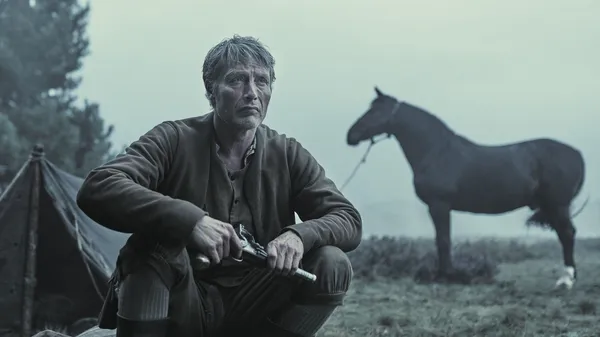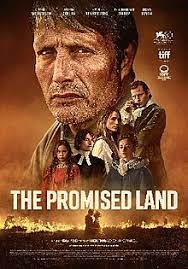Eye For Film >> Movies >> The Promised Land (2023) Film Review
The Promised Land
Reviewed by: Jennie Kermode

The history of European nations is, looked at romantically, a history of exploration and discovery; looked at through the eyes of those whose lands they visited, it is largely a history of invasion and conquest. One land, however, has a very different story. Despite being within the boundaries of Europe itself, and theoretically owned by Denmark for many centuries, north west Jutland remained undeveloped and largely uninhabited for most of that period. Explorers found nothing there but marshland and empty heath. There was nothing to conquer, and when expeditions tried to tame it, again and again, the land conquered them.
One notable attempt to build a settlement in that place was made in 1753 by agricultural surveyor and military lieutenant Ludwig van Kahlen, and this film, Denmark’s submission for the 2024 Oscars, is loosely based on his story. It’s a somewhat romanticised account which sanitises von Kahlen’s character and significantly embellishes real events, but the harshness of the challenges he faced still comes through clearly, and it still makes room for a powerful, complex performance by Mads Mikkelsen in the lead.

The conflict in the film is not just between the man and the land, but between the country’s emerging middle class and its still powerful aristocracy. Kahlen (the ‘von’ is dropped here) manages to get a commission from the King, and hopes that if he is successful he will be given a title, something whose personal importance to him will later be explained. He is not a politically sophisticated man, however, and finds himself variously exploited and manipulated by the councillors who stand between him and the monarch. He also comes into conflict with a landowner whose territory abuts his own, and who is concerned that his success might weaken his own power. This is De Schinkel (Simon Bennebjerg), a man whose brutal treatment of his own serfs also rubs Kahlen up the wrong way. Though the newcomer eschews sentimentality and does his best not to get involved, when a young couple seek shelter in his house, he finds his ambition compromised by his conscience.
Also complicating the situation are the laws, at the time, against employing Tatere people (Northern European Roma), who Denmark was trying to drive out of its lands. When he catches a young Tatere girl (Melina Hagberg) trying to steal from him, an awkward bond develops which gradually turns into something like a parent-child relationship. Meanwhile, despite the remoteness of the location, he manages to become romantically entangled with two different women, one of whom is an aristocrat whom De Schinkel wants for himself.
It is increasingly rare for a year to go by without Mikkelsen turning in an awards-worthy performance. This one netted him Best Actor at the European Film Awards, along with several other high profile nominations. The cinematography, by Rasmus Videbæk, has been similarly rewarded, bringing out both the bleakness and the beauty of the heath across a succession of seasons and effectively contrasting the comfortable existence of the wealthy, not so different from today, with the still medieval conditions in which the peasants toil. Writer/director Nikolaj Arcel is careful to make sure we understand that these people are perceived as property, with few rights. Kahlen sees them that way himself, though his encounters with other ways of thinking are important to his development over the course of the film.
The liberties which the film takes with history have their roots in a novel, Ida Jenssen’s The Captain And Anna Barbara, and this is the source of most of its problems. There are inevitable parallels with Braveheart, which made the same mistake, but thankfully the damage in this case is less severe and Mikkelsen is vastly more capable than Gibson of holding it together, more willing to play a character who is never wholly heroic. There is a redemption arc here, but it’s not the whole of the story, and Arcel uses it to highlight the deep inequities so normalised at the time as to be almost invisible, even the most desperate characters tending to take them for granted. As a result, the film punches harder than one might expect, and whilst it never quite achieves the greatness of which one suspects this team is capable, it’s well worth your time.
Reviewed on: 21 Jan 2024

















